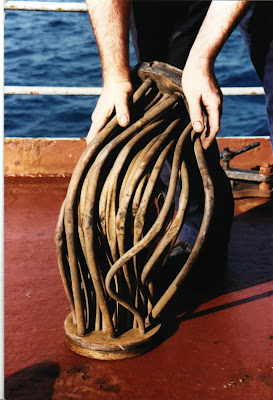STARTING AIR LINE EXPLOSIONS
During normal operation of air compressors a small amount of L.O. passes over with the air. By using a L.O. with the minimum of heavy ends (i.e. fairly volatile) and smooth pipe bores there is less tendency for the oil to deposit on the lines. It is carried through the air bottle. Normal regular draining of aftercolers, air lines and air reservoirs helps keep this oil to minimum. However, oil will deposit on all air pipe internals as a thin layer but it is not readily combustible. Should a cylinder air start valve leak during operation unburned fuel and cylinder oil may enter the manifold. This oil along with oil film already present will carbonize with further heating to form incandescent carbon (glowing flakes). If starting air is now applied while it is hot an explosion may occur causing flames to pass along the air pipe. Also if a large amount of oil has collected in the air start pipe it could pass into the cylinder, ignite and cause a flame to pass back along the air pipe while the V/V is still open again producing an explosion.

If a large amount of oil has collected in the air start pipework, although the flames passage can be stopped by a flame arrester the pressure wave can pass along the pipework, igniting and vibrating the oil molecules to produce a secondary explosion (i.e. auto ignition). Once auto ignition is achieved then due to the inertia of the gas, combustion may be at constant volume i.e. extremely rapid reaction rate, and this will be observed as delonation.
PREVENTION
By avoiding condition to produce a primary explosion by regular lubrication /or of air start valves. Regular testing of air start valves for leakage
a) In port by putting start air on without control air
b) Feeling air start pipes close to the cyl head (leaky v/v pipe hot).
Fit bursting caps in each start air pipe to relieve explosion or canbustion pressure if valve stuck open. Flame discs fitted at each unit and relief v/v fitted to start air manifold. Test operation of start air valves manually (SULZER) before stand by departure. – N/R v/v on supply.
Secondary explosion conditions are avoided by preventing oil collecting/reaching air start pipework:- By fitting oil/water traps and drains to all possible collecting points in the air system. Maintaining compressors in good mechanical condition and annual inspection of sections of start air pipework.









Keep in mind that it may be a serious mistake to consider sizing your Compressed Air Piping Systems solely for current flow requirements, rather than planning for future additions.
ReplyDeleteNice Post!!
ReplyDeletePlease Look Here At - We understand that industrial operations demand precision, durability, and uninterrupted performance. That’s why we integrate the latest piping technologies with robust materials to deliver systems that stand the test of time. For businesses in India seeking cost-effective yet high-performance compressed air piping solutions, Luthra Projects remains the go-to partner. Visit Compressed Air Piping Contractor in India